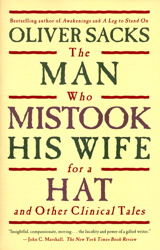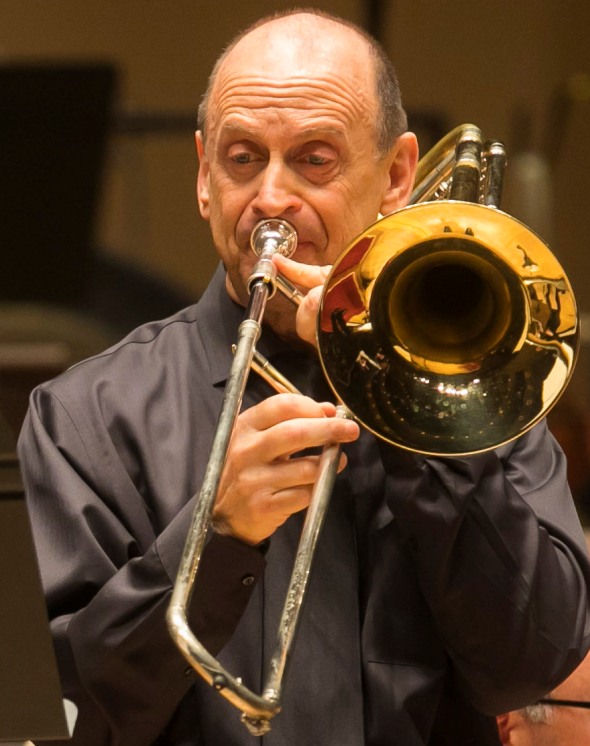CSO trombonist proves master of the mystical in premiere of Vine suite ‘Five Hallucinations’
Review: World premiere, Five Hallucinations, a trombone concerto by Carl Vine, featuring Chicago Symphony trombone Michael Mulcahy, James Gaffigan conducting.
By Nancy Malitz
The Chicago Symphony Orchestra was back in the new music business this week, as the remarkable virtuoso trombonist Michael Mulcahy, a member of the CSO’s brass battalion, performed the world premiere of a freely associative five-movement extravaganza for trombone and orchestra. Meanwhile, up the street at the Harris, at the Cultural Center and in clubs at all hours, the first ever Ear Taxi new music festival involving 800 musicians and 88 composers has made its own joyful noise.
The often dreamy and fantastical “Five Hallucinations” by Australian composer Carl Vine, born in 1954, is a monument to slow cooking: The idea for this CSO commission arose back in the Daniel Barenboim era, when Mulcahy made his solo debut with the orchestra, playing the high-flying alto trombone in a concerto by Mozart’s father, Leopold. You can still catch that 2000 performance on YouTube, below. Its success led the CSO to invite Mulcahy to choose a composer whom the orchestra might commission for another trombone concerto.
This being a big deal, Mulcahy started to think hard about who that composer should be. Then he thought some more. And more – for thirteen years or so, as the trombonist, who is nothing if not droll, explained to me by telephone.
“It was almost like choosing a wife,” he said. “I had considered very, very good people. The last top three were really incredible, and I think I chose well, but it was very difficult personally for me, at the end, to tell the others that I was actually marrying only one, not all three of them.”
 The winner was Vine, a native of Perth. (Mulhahy hails from Sydney.) Like many of his generation, Vine was taken by the writings of the neurologist Oliver Sacks, an avid researcher of the brain’s psychedelic inventiveness as it drifts into and out of conscious reality, whether via drugs, stress, illness, injury or the conventionally fluid dream-state. His 1985 book of case histories, “The Man Who Mistook His Wife for a Hat,” is perhaps Sacks’ most famous work.
The winner was Vine, a native of Perth. (Mulhahy hails from Sydney.) Like many of his generation, Vine was taken by the writings of the neurologist Oliver Sacks, an avid researcher of the brain’s psychedelic inventiveness as it drifts into and out of conscious reality, whether via drugs, stress, illness, injury or the conventionally fluid dream-state. His 1985 book of case histories, “The Man Who Mistook His Wife for a Hat,” is perhaps Sacks’ most famous work.
“Five Hallucinations” opened with the rise and fall of soft orchestral sounds, like slow breathing, an eerie purr. When the trombone interrupted the orchestra’s sweet snores, it was with a loud snort, and then came several startling soliloquies, as if some mysterious stranger had parachuted in to shout in one’s ear. Along the way, the trombone also picked up the occasional interlocutor – a piccolo, a tuba – for clever exchanges, while most of the orchestra maintained its peaceful reverie.
In “The lemonade speaks,” the second section, the orchestra seemed to awake, surrounding the trombone in a mystical forest of sound. Mulcahy, veering into a lyrical vein, waxed eloquent. Next followed a headlong Beethovenian section, as a single-minded rhythm patterned after the phrase “Mamma wants some cookies” whipped itself into frenzy. A suddenly still aftermath,“The Doppelgänger,” conveyed the creepy sense of awareness that one is possibly being followed, although in this chase the tables do turn, and the last of the hallucinations culminated in a brightly colored victory lap for everyone, trombone most of all. If you were of a certain age, your inner Woodstock cheered.
Mulcahy’s prolonged ovation, shared with the composer on hand for the occasion, was much deserved. The 37-year-old American maestro James Gaffigan did a clear-headed job of conducting throughout. Gaffigan, a first-prize winner in the 2004 Sir Georg Solti International Conducting Competition, is chief conductor of the Lucerne Symphony Orchestra. He framed the Vine premiere with a confident revival of Franck’s 15-minute symphonic poem “Le chausseur maudit” (The Accursed Huntsman), and chose a smartly balanced selection of movements from Prokofiev’s ballet “Cinderella” to round out the program.
The city’s Ear Taxi Festival continues through Oct. 10 with two more world premieres at the Harris Theater, these commissioned by the Chicago Symphony’s contemporary arm MusicNOW: an octet by composer, bassoonist and improviser Katherine Young called “the moss glows and the water is black,’ which is purported to dwell on the potential of the imagination; and Kyle Vegter’s “Monday or Tuesday,” a visual and musical meditation on the life and work of Virginia Woolf, whose “different kind of beauty (achieves) in the end, some kind of whole made of shimmering fragments.”
From noon daily, the day-into-night concerts will offer a total of 54 premieres in all, a truly surreal array of experiences. At whatever point you hail it, Ear Taxi promises a mind-bending ride.
Related Links:
- MusicNOW at the Ear Taxi Festival: Details at CSO.org
- CSO season calendar: View it at CSO.org
Tags: Carl Vine, Chicago Symphony, Five Hallucations, James Gaffigan, Michael Mulcahy



